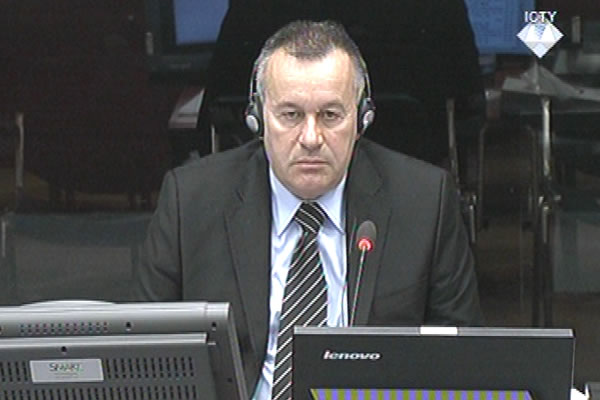Home
EXCHANGES WERE PART OF ETHNIC CLEANSING MACHINERY
Goran Krcmar, a member of the Commission for the Exchange of Prisoners in the 1st Krajina Corps, completed his evidence. In the final part of his testimony, the prosecutor insisted that the VRS actively participated in the exchanges of civilians. These exchanges were part of the ‘ethnic cleansing machinery’, the prosecutor explained. Milivoj Simic, the war-time commander of the Doboj Garrison, began his testimony
 Goran Krcmar, defence witness at Rako Mladic trial
Goran Krcmar, defence witness at Rako Mladic trial Goran Krcmar completed his evidence at the trial of Ratko Mladic. The witness was a member of the Commission for the Exchange of Prisoners in the VRS 1st Krajina Corps. In the cross-examination, the prosecutor put it to him that the exchanges were part of the ‘ethnic cleansing machinery’. Prosecutor Traldi presented evidence showing that in addition to the exchanges of prisoners of war, the VRS was involved in the exchanges of civilians, including women, children and the elderly.
As he was questioned by the prosecutor, Krcmar said that civilians ‘were not exchanged’; they ‘voluntarily’ left Republika Srpska and went to the BH Army-controlled areas or to third countries. A Republika Srpska agency ‘organized’ those evacuation, and the VRS ‘helped’ because ‘border points’ located in combat zones had to be secured, the witness explained.
The prosecutor reminded the witness of the mass evacuation of Croats from Central Bosnia through the territory controlled by the VRS control in June 1993. On 8 June 1993, Mladic signed a Main Staff document in which he instructed his troops to demand from the HVO, in return for the safe passage of Bosnian Croats, to hand over all Serb prisoners and to allow Serbs from Tomislavgrad and Livno municipalities to cross into the Serb territory, the prosecutor noted.
Krcmar claimed that there were no conditions at all: it was done in a bid to ‘save the Croat population’ from the Lasva valley. ‘The least you can do is not to consider this humane act as some kind of an exchange and not make it into something dishonorable’, Krcmar noted. The fact that the VRS documents the prosecutor showed consistently use the term ‘exchanges’ to mean demarcation line crossings was in Krcmar’s view ‘a terminological mistake’.
The prosecutor went on to confront the witness with a similar document in which UNPROFOR officials raised their concerns about ‘civilian exchanges’ between the warring factions in Bosnia and Herzegovina. According to the UNPROFOR officials, the exchanges were ‘poorly disguised ethnic cleansing’. Krcmar replied that the prosecutor was once again trying to ‘establish a link between the extremely honorable transactions and the realm of a purported ethnic cleansing machinery’. ‘This is not fair’, the witness complained.
After Goran Krcmar completed his evidence, the defense called Milivoj Simic. During the war, Simic commanded the Doboj Garrison.
Linked Reports
- Case : Mladic
- 2015-03-02 WITNESS: THERE WERE CRIMES, BUT I CAN'T SAY WHICH ONES
- 2015-02-26 ARE MUJAHIDEEN CRIMES RELEVANT FOR MLADIC’S TRIAL?
- 2015-02-25 WHAT WITNESSES TALK ABOUT AS THEY WAIT TO TESTIFY
- 2015-03-04 WHAT IS AND WHAT ISN’T CREDIBLE?
- 2015-03-05 WHAT DID MLADIC SAY AND DO IN KONJEVIC POLJE ON 13 JULY 1995?
- 2015-03-05 WITNESS KNOWS NOTHING ABOUT UNIDENTIFIED INCIDENTS
